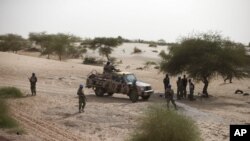Conflict
al-Qaida Expands Mali Attacks

Al-Qaida jihadists are tightening the screws on Mali's military junta, extending their attacks to the south of the country and hitting a key garrison town on the outskirts of the capital.
Raids last week displayed coordination and operational complexity at a range that is unprecedented in the country's decade-long jihadist campaign, say analysts.
Last Thursday, six attacks unfolded simultaneously at 5 am, striking the country's troubled center as well as the southern regions of Sikasso, Koulikoro and Kayes, which until now had never been targeted.
The following day, two explosive-laden vehicles smashed into the gates of an army building in Kati, a garrison town 15 kilometers from Bamako, killing a soldier.
The suicide raid was claimed by the Support Group for Islam and Muslims (GSIM), the main jihadist alliance in the Sahel and an Al-Qaida affiliate, according to monitoring group SITE.
The operation was "a way of telling (the authorities) that they can strike anywhere," a Malian analyst in the central town of Sevare told AFP.
GSIM was created in 2017 from several groups -- Al-Qaida in the Islamic Maghreb, an early pioneer of jihadism in the Sahel that was born in 2007, and Katiba Macina, Ansar Dine and Al-Mourabitoun, which were also led by veteran militants.
A UN-based expert in jihadist groups said the GSIM's southward push emulated its successful "strategy of contagion" in the center of the country.
Jihadists first struck the north of Mali in 2012, joining a regional insurgency.
After being scattered the following year by French forces, they regrouped, in 2015 launching attacks in the ethnically volatile centre and cross-border raids on Niger and Burkina Faso.
Across the three countries, thousands of civilians have been killed and more than two million have been displaced, and the economic damage has been devastating.
Heni Nsaibia, a researcher at the Armed Conflict Location & Event Data Project (ACLED), said the recent attacks had had "modest results, bearing in mind the means that were deployed".
However, they were also a potent demonstration of the GSIM's powers of coordination, proving the organization is not "just a coalition of disparate groups", he said.
One insight that emerges is the "major freedom of movement" for jihadists between the center and south of the country, demonstrating the GSIM's influence over a vast area that includes the border with Burkina Faso, said Nsaibia.
A recent report by UN specialists described a "southwards corridor" enabling GSIM to "extend towards the Atlantic coast" and countries on the Gulf of Guinea beyond Burkina Faso, notably Benin and Togo, where cross-border attacks have been rising.
GSIM's targeted tactics contrast with those adopted by Islamic State jihadists in Mali, who are often blamed for indiscriminate massacres of civilians.
In areas where it wields special clout, such as the arid regions of the north, the GSIM tries to set up a parallel government to the state, say local sources.
They try to win over local people to their vision of a just and protective society, "proposing Islamic justice, access to health care and security", said a security source in Timbuktu.
See all News Updates of the Day
Africa News Tonight: Hunger, violence stalk Goma residents, US considers AFRICOM changes, Cyclone batters southern Africa
Africa News Tonight: Angola advances DRC talks, Tunisian opposition leaders remain jailed, US firefighters team up with Liberian colleagues
Southern Africa bloc to begin phased withdrawal of troops from DRC
The Southern African Development Community or SADC said Thursday that a summit of regional heads of state had terminated the mandate of its troop deployment in the eastern part of the Democratic Republic of Congo and decided on a "phased withdrawal." SADC lost more than a dozen soldiers in conflict in January. The 16-nation bloc took the decision at a virtual summit on the conflict in the area that has seen some three decades of unrest and claimed millions of lives. "Summit terminated the Mandate of SAMIDRC and directed the commencement of a phased withdrawal of SAMIDRC troops from the DRC," the Southern African bloc said in a communique after the summit. The SADC Mission in the Democratic Republic of Congo, SAMIDRC, — made up of soldiers from Malawi, Tanzania and South Africa — was sent to the region in December 2023 to help the government of the DRC, also a SADC member, restore peace and security. SADC extended its mandate late last year.
Africa News Tonight: DRC, US in talks on trade and security, concerns of civil war risk in South Sudan, tariff talk rattles stock markets
University students resume studies in Bukavu as DRC crisis deepens
University students in Bukavu, in the east of the Democratic Republic of Congo, are gradually returning to class for the first time since M23 rebels took their city last month. Toto Mufungizi, a student, said while they were home “during these months, we have endured many strange things.” “We stayed at home for at least one month and three weeks. We were confined due to this security situation. Even today, there is no serenity, we cannot move around safely," he told Reuters. The M23 rebel group captured Bukavu, South Kivu's capital, in mid-February, forcing a weeks-long suspension of academic activities. The Official University of Bukavu, UOB, and other institutions have now reopened, but security concerns persist. "We are afraid because we heard rumors that in Goma, students were kidnapped. Here, we are also afraid," third-year student Patient Kaliwe said. Some information for this report was provided by Reuters.